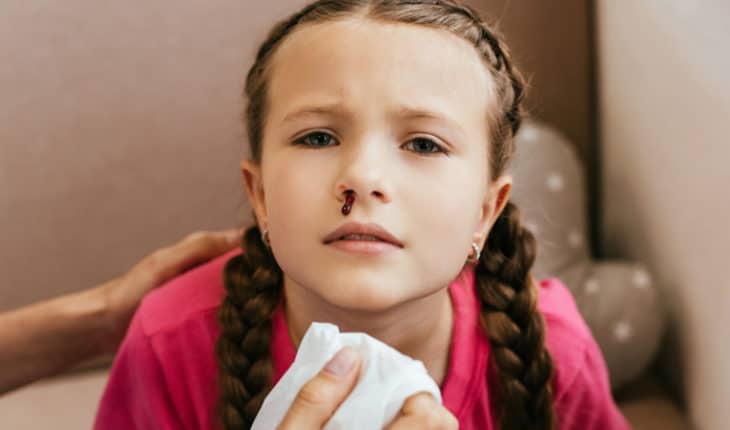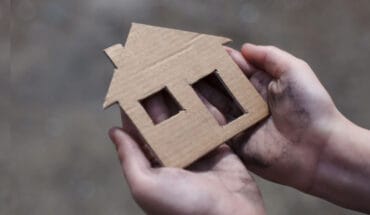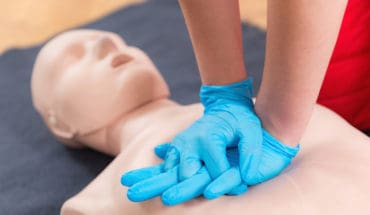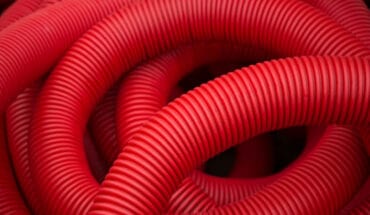Children often have nose bleeds. They can be a result of warm weather or exercise, which dilate the small blood vessels in their nose, or they can be the result of picking or poking their noses, or running into things.
If a child has a nose bleed
- Sit them down.
- Grab something absorbent to catch the blood.
- Lean them forward, pinching the bridge of the nose. Leaning the child forward whilst applying pressure to the nose will allow you to see when the bleeding has stopped and will avoid the blood trickling down the back of their throat which could make them sick. You should apply pressure and try to compress the leaking blood vessel against the inside of the nose to stop it bleeding.
- Keep changing your grip until you have got to a point where no blood is coming out.
- Keep applying pressure for at least 10 minutes.
- Release pressure slightly and if it starts to bleed again hold for another 10 minutes.
If it really won’t stop bleeding you will need medical help. Advise them not to pick, poke or blow their nose. If it starts again you will have to apply pressure once more.
Special Situation
If the nose bleed has been caused by trauma, or a punch in the face, controlling the bleeding may be difficult but you need to try as loss of blood is dangerous. You should apply a wrapped ice pack, keep applying pressure and get medical help.
Head injuries
Children also frequently bang their heads and it is difficult to tell whether or not they have done any serious damage. Most head injuries are not serious and simply result on a bump or bruise. However, severe or repeated head injuries can cause damage to the brain.
Most blows to the head result in injury to the scalp only and this is more frightening than life-threatening. The head and face are very vascular which means these injuries bleed profusely and can be very scary!
It is very important to look out for anything unusual following a head injury; a severe bang on the head could cause swelling and damage to the brain and it is vitally important that you recognise any early and worrying signs of increased pressure on the brain.
What to look for
Call 999 or 112 if a child:
- has lost consciousness, even momentarily
- won’t stop crying
- complains of head and neck pain
- isn’t walking normally
- What to do
If the child has not lost consciousness and is alert and behaving normally after the fall or blow:
1/Apply a wrapped ice pack or instant cold pack to the injured area for 10 minutes.
2/Observe your child carefully for the next 48 hours. If you notice any of the signs of brain injury (see below), phone an ambulance immediately.
3/If the incident has occurred close to bedtime or naptime and your child falls asleep soon afterward, check in every few hours to look for twitching limbs or disturbances in colour or breathing. It is okay for your child to go to sleep – there is no need to keep a child awake after a head injury – but you do need to remain vigilant. If you are concerned in any way, wake them up to check on them properly.
4/ If a child can’t be woken or shows any symptoms of a brain injury (see below) call an ambulance immediately.
Suspected brain injury
The brain is cushioned by cerebrospinal fluid, however a severe blow to the head may knock the brain into the side of the skull (see above) or tear blood vessels.
It can be difficult to determine the level of injury, so it’s always wise to discuss a head injury with your doctor. A clear indicator of a serious injury is when a child loses consciousness or has signs of confusion. These symptoms can come on at any time from immediately after the accident to a couple of days later. It is sensible to have your child sleep in the same room as you for a couple of nights following a head injury.
Signs of brain injury
Call an ambulance if a child shows any of these symptoms:
- unconsciousness
- abnormal breathing
- obvious serious wound or suspected skull fracture
- bleeding or clear fluid from the nose, ear or mouth
- disturbance of speech or vision
- pupils of unequal size
- weakness or paralysis
- dizziness
- neck pain or stiffness
- fitting
- vomiting more than two or three times (it is not unusual for children to vomit immediately after an accident as a response to pain, so do not panic if your child is sick just once after a head injury).
If the child is unconscious
- If they are breathing, roll them into the recovery position (on their side so their tongue falls forward in their mouth and any vomit can drain away), trying not to twist their neck or spine. Any head injury could have caused spinal damage.
- If they are not breathing start CPR.
- Call an ambulance.
If the child is conscious but it is a serious injury
1/ Phone for an ambulance.
2/ Do your best to keep your child calm and still – try not to let them twist as if they have damaged their spine this could lead to a spinal cord injury.
3/ If there is any bleeding, grab a clean cloth and apply pressure.
- Do not attempt to clean the wound as it could make things worse.
- Do not apply forceful direct pressure to the wound if you suspect the skull is fractured.
- Never remove any embedded object from wound.
- What is a seizure? - 13th March 2025
- Febrile Convulsions and Seizures in Children - 13th March 2025
- Why women are less likely to receive CPR or survive cardiac arrest - 6th March 2025






